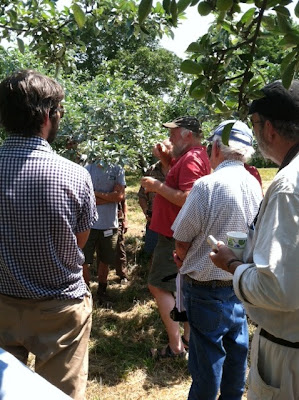Guest blogger Bernadette
Giblin, NOFA AOLCP & Founder, Safeground Organic Landcare Consulting
 |
“The City of Brotherly Love” is filled with many incredible murals. This one adjacent the PHS seemed to capture
the spirit of NOFA’s OLC accreditation course. |
 |
The “CHANGING THE GAME” billboard in the backdrop of the
PECO green roof seemed to signify what NOFA
accreditation is all about. |
I’m back from having a great time participating in the first
NOFA Organic Land Care Accreditation Course of 2013! The January 14
th-17
th
course held in Philadelphia, PA was not only the season opener but, it was also
the first time the course was on the road in Pennsylvania. CT NOFA OLC had the
pleasure of collaborating with
the Pennsylvania
Horticultural Society. And what a great partner they found in PHS. They’re the organization that’s responsible
for the largest indoor flower show in the World! And they did a super job
hosting the 50+ enthusiastic participants at PHS on Monday- Thursday for the NOFA
OLC Accreditation Course. Many of which, I’m pleased to report, were from
Philadelphia Park & Recreation.
Julie Snell and Nancy
O’Donnell, just two of the supportive PHS team members we had the pleasure of
getting acquainted with, helped make everyone feel welcome in these great
accommodating facilities.
And it goes without saying that dedicated OLC staffers
worked tirelessly delivering the highest quality programming that the course has become synonymous with.
It’s always fun and rewarding
being in the company of AOLCP’s sharing our commitment to protecting the health
of the environment through educating traditional landscapers and other green
professional in organic management best practices. I had the distinct pleasure of kicking off
the course with the Principles & Procedures section normally taught
by founding OLC Board Member Kim Stoner, who was unable to attend. I loved getting the opportunity to enlighten
the 50 or more new professionals in the room about organic land care, the
importance of the OLC standards we adhere to and the network of OLCP support
they’ve joined.
 |
Site visit to the green roof of the
Philadelphia Electric Company (PECO) |
Green
professionals receive a foundation when they learn OLC best practices.
 |
| Frank, myself & Chip |
NOFA OLC founding Board
Member Mike Nadeau of Plantscapes followed me with Site Assessment. He shared the words of his mentor, “ The
greatest pathogen to plants is the landscaper.” Reveared Soil Scientist Dr.
Elaine Ingham (a.k.a., the Mother of Compost Tea) was in from the Rodale
Institute to impart wisdom on soil fundamentals, biology & health. She equated nature to a book that we must all
learn how to read. “You got a problem, read the book!” She also suggested we
OLCP’s, “sweet talk clients away from
turf.” And if we weren’t successful, Mister organic turf himself, Chip Osborne
followed up to empower us with tools to transition turf to organics. Chip echoed Dr. Ingham sentiments by stating,
“The #1 goal is to improve soil quality.”
 |
Chip and I thought this
might be an interesting
dining experience |
Suzanne Wainwright-Evans
(a.k.a. The Bug Lady) shared a wealth of knowledge about our indespensible
bretheren of the insect community. I wanted to bale on my mission driven OLC
consulting, grant writing and social media marketing practice to be an
entomologist!

Glen Abrams from the
Philadelphia Water Department (PWD) updated us on the city’s 25 year plan,
GREEN CITY, CLEAN WATER, is the most progressive in the nation. It focuses on protecting their watershed by
managing stormwater with innovative green infrastructure. PWD’s sustainability
initiative to broaden its green mission as well as comply with stricter
environmental laws. Clean water is no
longer about putting water it in a pipe and transporting it to a municipal
treatment facility. Clean water is now
about using pervious pavements, plants and soils the way Nature intended; to
filter pathogens and clean water right where it lands.
There were other fabulous presentations like Frank Crandall who talked
about the right plant right place principal, as well as the business side of
things. I know I’m missing so many
others in this post so please forgive me.
You were great! Especially
Jenna Messier & Kristiane Huber, for their hard work to make 2013 training
in Pennsylvania invaluable for all who participated!
 |
Program Director Jenna Messier and
Course Coordinator Kristiane Huber |
Best of luck to new and, dare I say, old AOLCP’s in 2013! Here’s to a game changing year for us all ;-)
Bernadette
NOFA AOLCP & Founder,
Safeground Organic Landcare Consulting















 When Nash Pradhan told his parents he wanted to move to the United States, they thought he was "absolutely crazy." The Nairobi, Kenya native was just 24 years old and his three brothers and four sisters didn't share his aspirations. His father worked for a canvas sewing production company while his mother raised the family.
When Nash Pradhan told his parents he wanted to move to the United States, they thought he was "absolutely crazy." The Nairobi, Kenya native was just 24 years old and his three brothers and four sisters didn't share his aspirations. His father worked for a canvas sewing production company while his mother raised the family.

.JPG)
.JPG)
























